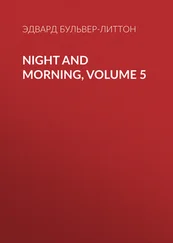Эдвард Бульвер-Литтон - Night and Morning, Complete
Здесь есть возможность читать онлайн «Эдвард Бульвер-Литтон - Night and Morning, Complete» — ознакомительный отрывок электронной книги совершенно бесплатно, а после прочтения отрывка купить полную версию. В некоторых случаях можно слушать аудио, скачать через торрент в формате fb2 и присутствует краткое содержание. Жанр: foreign_prose, literature_19, Европейская старинная литература, foreign_antique, на английском языке. Описание произведения, (предисловие) а так же отзывы посетителей доступны на портале библиотеки ЛибКат.
- Название:Night and Morning, Complete
- Автор:
- Жанр:
- Год:неизвестен
- ISBN:нет данных
- Рейтинг книги:3 / 5. Голосов: 1
-
Избранное:Добавить в избранное
- Отзывы:
-
Ваша оценка:
- 60
- 1
- 2
- 3
- 4
- 5
Night and Morning, Complete: краткое содержание, описание и аннотация
Предлагаем к чтению аннотацию, описание, краткое содержание или предисловие (зависит от того, что написал сам автор книги «Night and Morning, Complete»). Если вы не нашли необходимую информацию о книге — напишите в комментариях, мы постараемся отыскать её.
Night and Morning, Complete — читать онлайн ознакомительный отрывок
Ниже представлен текст книги, разбитый по страницам. Система сохранения места последней прочитанной страницы, позволяет с удобством читать онлайн бесплатно книгу «Night and Morning, Complete», без необходимости каждый раз заново искать на чём Вы остановились. Поставьте закладку, и сможете в любой момент перейти на страницу, на которой закончили чтение.
Интервал:
Закладка:
“Dear Catherine,
“Your forgiving and affectionate brother, “ROGER MORTON.“High Street, N–, June 13.”
“P.S.—Mrs. M. says that she will be a mother to your little boy, and that you had better mend up all his linen before you send him.”
As Catherine finished this epistle, she lifted her eyes and beheld Philip. He had entered noiselessly, and he remained silent, leaning against the wall, and watching the face of his mother, which crimsoned with painful humiliation while she read. Philip was not now the trim and dainty stripling first introduced to the reader. He had outgrown his faded suit of funereal mourning; his long-neglected hair hung elf-like and matted down his cheeks; there was a gloomy look in his bright dark eyes. Poverty never betrays itself more than in the features and form of Pride. It was evident that his spirit endured, rather than accommodated itself to, his fallen state; and, notwithstanding his soiled and threadbare garments, and a haggardness that ill becomes the years of palmy youth, there was about his whole mien and person a wild and savage grandeur more impressive than his former ruffling arrogance of manner.
“Well, mother,” said he, with a strange mixture of sternness in his countenance and pity in his voice; “well, mother, and what says your brother?”
“You decided for us once before, decide again. But I need not ask you; you would never—”
“I don’t know,” interrupted Philip, vaguely; “let me see what we are to decide on.”
Mrs. Morton was naturally a woman of high courage and spirit, but sickness and grief had worn down both; and though Philip was but sixteen, there is something in the very nature of woman—especially in trouble—which makes her seek to lean on some other will than her own. She gave Philip the letter, and went quietly to sit down by Sidney.
“Your brother means well,” said Philip, when he had concluded the epistle.
“Yes, but nothing is to be done; I cannot, cannot send poor Sidney to—to—” and Mrs. Morton sobbed.
“No, my dear, dear mother, no; it would be terrible, indeed, to part you and him. But this bookseller—Plaskwith—perhaps I shall be able to support you both.”
“Why, you do not think, Philip, of being an apprentice!—you, who have been so brought up—you, who are so proud!”
“Mother, I would sweep the crossings for your sake! Mother, for your sake I would go to my uncle Beaufort with my hat in my hand, for halfpence. Mother, I am not proud—I would be honest, if I can—but when I see you pining away, and so changed, the devil comes into me, and I often shudder lest I should commit some crime—what, I don’t know!”
“Come here, Philip—my own Philip—my son, my hope, my firstborn!”—and the mother’s heart gushed forth in all the fondness of early days. “Don’t speak so terribly, you frighten me!”
She threw her arms round his neck, and kissed him soothingly. He laid his burning temples on her bosom, and nestled himself to her, as he had been wont to do, after some stormy paroxysm of his passionate and wayward infancy. So there they remained—their lips silent, their hearts speaking to each other—each from each taking strange succour and holy strength—till Philip rose, calm, and with a quiet smile, “Good-bye, mother; I will go at once to Mr. Plaskwith.”
“But you have no money for the coach-fare; here, Philip,” and she placed her purse in his hand, from which he reluctantly selected a few shillings. “And mind, if the man is rude and you dislike him—mind, you must not subject yourself to insolence and mortification.”
“Oh, all will go well, don’t fear,” said Philip, cheerfully, and he left the house.
Towards evening he had reached his destination. The shop was of goodly exterior, with a private entrance; over the shop was written, “Christopher Plaskwith, Bookseller and Stationer:” on the private door a brass plate, inscribed with “R– and – Mercury Office, Mr. Plaskwith.” Philip applied at the private entrance, and was shown by a “neat-handed Phillis” into a small office-room. In a few minutes the door opened, and the bookseller entered.
Mr. Christopher Plaskwith was a short, stout man, in drab-coloured breeches, and gaiters to match; a black coat and waistcoat; he wore a large watch-chain, with a prodigious bunch of seals, alternated by small keys and old-fashioned mourning-rings. His complexion was pale and sodden, and his hair short, dark, and sleek. The bookseller valued himself on a likeness to Buonaparte; and affected a short, brusque, peremptory manner, which he meant to be the indication of the vigorous and decisive character of his prototype.
“So you are the young gentleman Mr. Roger Morton recommends?” Here Mr. Plaskwith took out a huge pocketbook, slowly unclasped it, staring hard at Philip, with what he designed for a piercing and penetrative survey.
“This is the letter—no! this is Sir Thomas Champerdown’s order for fifty copies of the last Mercury, containing his speech at the county meeting. Your age, young man?—only sixteen?—look older;—that’s not it—that’s not it—and this is it!—sit down. Yes, Mr. Roger Morton recommends you—a relation—unfortunate circumstances—well educated—hum! Well, young man, what have you to say for yourself?”
“Sir?”
“Can you cast accounts?—know bookkeeping?”
“I know something of algebra, sir.”
“Algebra!—oh, what else?”
“French and Latin.”
“Hum!—may be useful. Why do you wear your hair so long?—look at mine. What’s your name?”
“Philip Morton.”
“Mr. Philip Morton, you have an intelligent countenance—I go a great deal by countenances. You know the terms?—most favourable to you. No premium—I settle that with Roger. I give board and bed—find your own washing. Habits regular—‘prenticeship only five years; when over, must not set up in the same town. I will see to the indentures. When can you come?”
“When you please, sir.”
“Day after to-morrow, by six o’clock coach.”
“But, sir,” said Philip, “will there be no salary? something, ever so small, that I could send to my another?”
“Salary, at sixteen?—board and bed—no premium! Salary, what for? ‘Prentices have no salary!—you will have every comfort.”
“Give me less comfort, that I may give my mother more;—a little money, ever so little, and take it out of my board: I can do with one meal a day, sir.”
The bookseller was moved: he took a huge pinch of snuff out of his waistcoat pocket, and mused a moment. He then said, as he re-examined Philip:
“Well, young man, I’ll tell you what we will do. You shall come here first upon trial;—see if we like each other before we sign the indentures; allow you, meanwhile, five shillings a week. If you show talent, will see if I and Roger can settle about some little allowance. That do, eh?”
“I thank you, sir, yes,” said Philip, gratefully. “Agreed, then. Follow me—present you to Mrs. P.” Thus saying, Mr. Plaskwith returned the letter to the pocket-book, and the pocket-book to the pocket; and, putting his arms behind his coat tails, threw up his chin, and strode through the passage into a small parlour, that locked upon a small garden. Here, seated round the table, were a thin lady, with a squint (Mrs. Plaskwith), two little girls, the Misses Plaskwith, also with squints, and pinafores; a young man of three or four-and-twenty, in nankeen trousers, a little the worse for washing, and a black velveteen jacket and waistcoat. This young gentleman was very much freckled; wore his hair, which was dark and wiry, up at one side, down at the other; had a short thick nose; full lips; and, when close to him, smelt of cigars. Such was Mr. Plimmins, Mr. Plaskwith’s factotum, foreman in the shop, assistant editor to the Mercury. Mr. Plaskwith formally went the round of the introduction; Mrs. P. nodded her head; the Misses P. nudged each other, and grinned; Mr. Plimmins passed his hand through his hair, glanced at the glass, and bowed very politely.
Читать дальшеИнтервал:
Закладка:
Похожие книги на «Night and Morning, Complete»
Представляем Вашему вниманию похожие книги на «Night and Morning, Complete» списком для выбора. Мы отобрали схожую по названию и смыслу литературу в надежде предоставить читателям больше вариантов отыскать новые, интересные, ещё непрочитанные произведения.
Обсуждение, отзывы о книге «Night and Morning, Complete» и просто собственные мнения читателей. Оставьте ваши комментарии, напишите, что Вы думаете о произведении, его смысле или главных героях. Укажите что конкретно понравилось, а что нет, и почему Вы так считаете.












